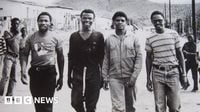South African President Cyril Ramaphosa has ordered a judicial inquiry aimed at uncovering whether previous governments intentionally obstructed investigations and prosecutions of crimes committed during the apartheid era. This significant announcement, made on April 30, 2025, marks a pivotal moment for survivors and families of victims who have long sought justice.
In a statement released by his office, Ramaphosa expressed his understanding of the "anguish and frustration" felt by families of victims, emphasizing the importance of addressing allegations of improper influence that have hindered investigations against post-apartheid governments led by the African National Congress (ANC). The inquiry follows a court case initiated in January 2025 by a group of 25 survivors and relatives of apartheid-era victims, who are seeking $9 million in damages from the government.
The plaintiffs argue that since the late 1990s, successive governments have failed to adequately investigate unresolved killings, disappearances, and other crimes committed during apartheid, despite the recommendations made by the Truth and Reconciliation Commission (TRC). Established in 1996 under the leadership of then-President Nelson Mandela, the TRC aimed to expose and document the atrocities of apartheid while offering amnesty to some perpetrators who confessed their crimes.
The ANC, which played a crucial role in dismantling the apartheid regime and ushering in democracy in 1994, has faced criticism for prioritizing reconciliation over justice for victims. One of the most notorious unresolved cases involves the Cradock Four, a group of Black anti-apartheid activists who were abducted and murdered by security forces in 1985. Their bodies were burned, and despite the involvement of security officers, no one has been prosecuted for their deaths.
Lukhanyo Calata, the son of Fort Calata—one of the Cradock Four—has been vocal in his criticism of the government's inaction. He stated at the beginning of the court case that since the presidency of Thabo Mbeki from 1999 to 2008, the government has neglected to act on the TRC's findings, effectively denying justice to victims and their families. Calata and other relatives contend that government ministers intervened to obstruct investigations and prosecutions.
Ramaphosa's announcement of the inquiry comes three decades after the end of apartheid and reflects growing public frustration over the lack of accountability for past crimes. The inquiry is expected to examine the extent of political interference in the prosecution of apartheid-era crimes and to establish a timeline for its findings. The presidency acknowledged that allegations of improper influence have persisted from previous administrations, further complicating the quest for justice.
As the inquiry unfolds, many hope it will finally provide answers and closure to those affected by apartheid's brutal legacy. The TRC, while a monumental step toward healing, has been criticized for its limited success in bringing perpetrators to justice. Many families still wait for acknowledgment and accountability, as the ghosts of apartheid continue to loom large over South Africa.
In the wake of Ramaphosa's announcement, the inquiry's head and its timetable will soon be revealed, and it is anticipated that the investigation will delve deeply into the systemic failures that have allowed many apartheid-era crimes to go unpunished.
The ongoing struggle for justice in South Africa highlights the complexities of reconciling a painful past with the aspirations of a democratic future. As the nation reflects on its history, the inquiry could serve as a crucial step toward addressing the deep-seated wounds of apartheid and restoring faith in the justice system.
For many survivors and families of victims, the inquiry is not just about seeking financial compensation; it represents a long-overdue acknowledgment of their suffering and a chance to hold accountable those who obstructed the pursuit of justice. As the investigation progresses, the hope remains that the truth will finally emerge, allowing South Africa to heal and move forward.




